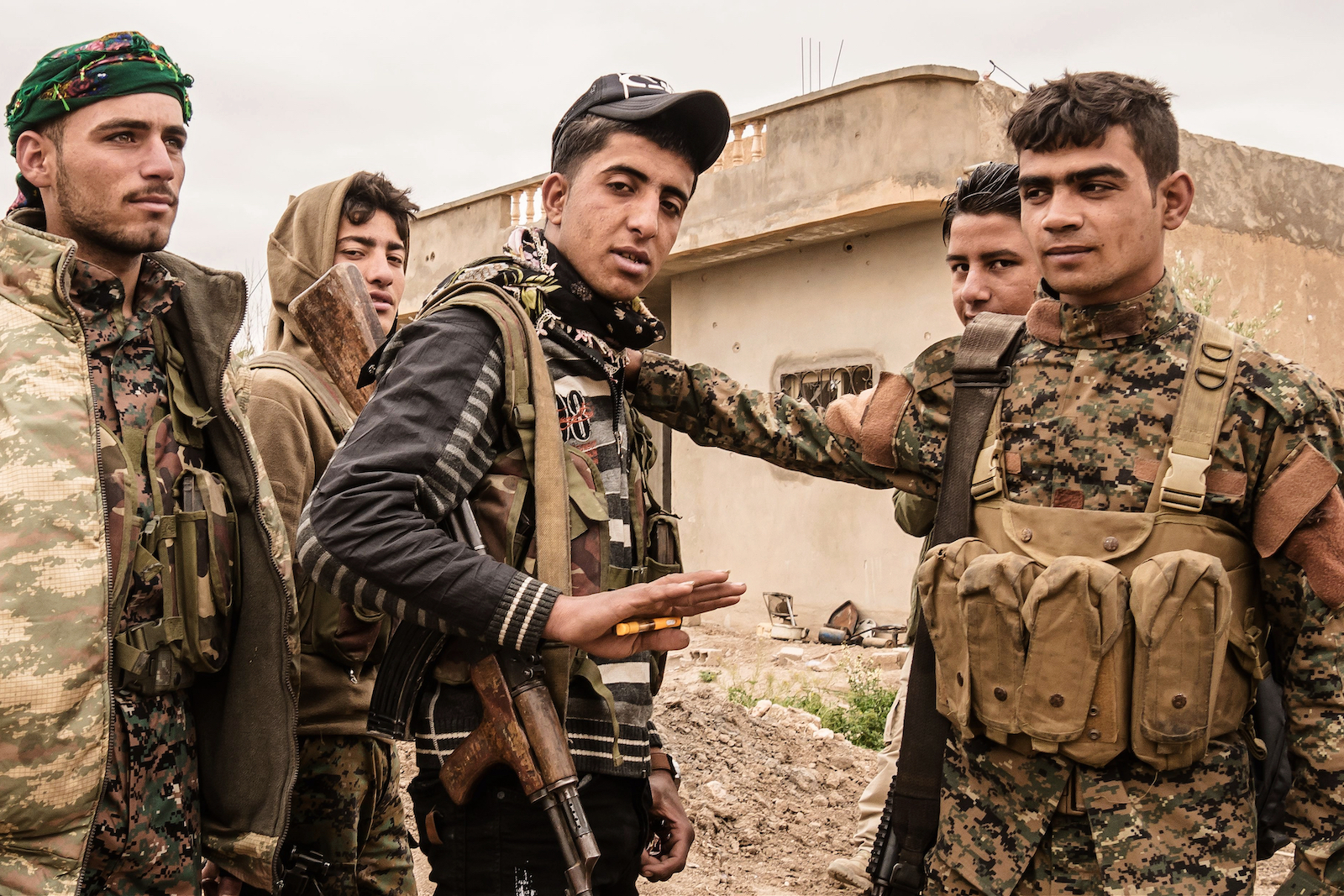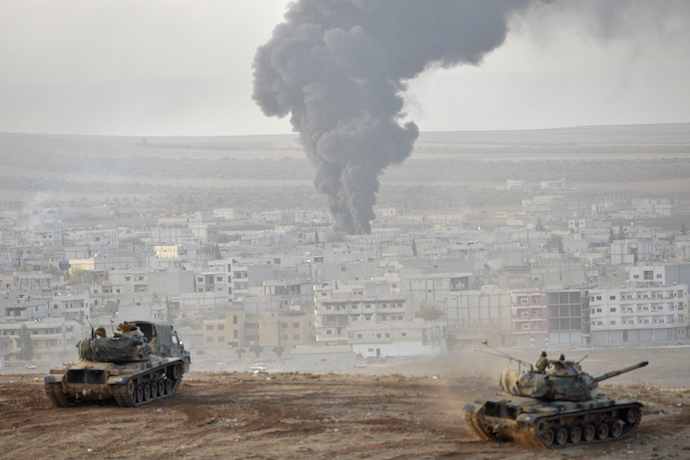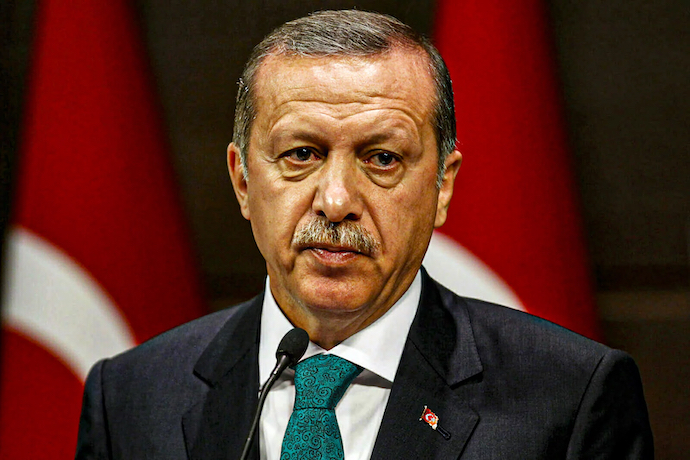
Turkey Exploits Gaza Distraction to Pound the Kurds
Amid U.S. Secretary of State Antony Blinken’s visit to the Middle East in a bid to keep the conflict in Gaza between Israel and Hamas contained, Turkey has continued to target Kurdish populations living in northeastern Syria.
In Rojava, a de facto autonomous region in northeastern Syria, Turkey’s military has been hitting vital infrastructure. Turkey’s bombardments have struck essential infrastructure, including power stations, fuel stores, and food production facilities, leaving over a million people deprived of water and electricity. These attacks seem to be part of a strategy to displace the local population, furthering a policy of Turkification and extending Turkish control over this Syrian territory.

Ankara has consistently opposed the idea of a sovereign Kurdish state, citing a mix of historical, political, security, and territorial apprehensions. Turkey, which hosts a considerable Kurdish demographic predominantly in its southeast, expresses concern that the birth of a Kurdish state may embolden separatist sentiments within its borders, potentially inciting internal strife and jeopardizing the nation’s territorial unity.
The Kurdish question in Turkey is steeped in history, marred by enduring disputes over cultural rights, political representation, and autonomy. Turkey perceives that the emergence of a Kurdish state could intensify these historical frictions. The Kurdistan Workers’ Party (PKK), which has been locked in an armed conflict with the Turkish state for several decades, is labeled a terrorist organization by Turkey and some other nations. Turkey is apprehensive that a sovereign Kurdish state could become a refuge for the PKK, thereby presenting a direct security threat.
Moreover, Turkey is concerned about the effect Kurdish independence could have on the already volatile Middle Eastern geopolitical landscape. The emergence of a new state could potentially trigger additional conflicts and instability in the region. Turkey’s position is further complicated by its diplomatic relations with neighboring states and global powers. It must navigate between its own interests, the perspectives of regional players like Iran and Iraq, and its alliances with Western nations.
Natural resources also play a role; areas inhabited by Kurds in neighboring countries like Iraq are abundant in oil, and the financial implications of an independent Kurdish state with control over these resources are a significant concern for Turkey.
Syria is a critical factor in the Kurdish issue. Like Turkey, Iraq, and Iran, Syria has a substantial Kurdish population, predominantly in the northeast of the country. The Syrian civil war has resulted in Kurds achieving a degree of autonomy in some regions, particularly Rojava. The power vacuum created by the civil war allowed Kurdish forces to assert control over significant territories. This shift is a source of anxiety for Turkey, as it could embolden Kurdish separatist efforts within its own borders.

Turkish President Recep Tayyip Erdogan has specific apprehensions regarding the Syrian Kurdish left-wing political party, the Democratic Union Party (PYD), and its military wing, the People’s Protection Units (YPG). Erdogan perceives these groups as extensions of the PKK.
In a recent report by Arab News, Turkish officials disclosed the targeted killing of Sherwan Hassan, known as Roni Walat, a key Kurdish commander, in northeast Syria, signaling a continued offensive against Syrian Kurdish leadership. Hassan, a founder of the Kurdish Self-Defense Forces (HXP) and a member of the Deir ez-Zor Military Council, was assassinated by an explosive device on December 5th, following a meeting with the coalition fighting the Islamic State (IS), as per the International Crisis Group.
The report highlights a surge in violence from 2016 to 2022 across northern Iraq and Syria, with escalated clashes between Turkish forces, the YPG, and the PKK’s Syrian affiliates. During this period, Turkey has increasingly leveraged its airpower, including armed drones, to counteract PKK-related groups.
In a notable demographic maneuver, Abdulrahman Apo, a Kurdish political leader, declared that Turkey has facilitated the relocation of 10,000 Arab Palestinians to Afrin, a city in Rojava under Turkish control, altering the population balance and diminishing the Kurdish presence.
Following the Turkish military’s capture of Afrin in March 2018, a strategy aimed at promoting Arabization in Kurdish territories, there has been significant financial backing from various Arab nations.
In 2013, the PYD and YPG formed three autonomous cantons in Syrian Kurdistan—Jazeera, Kobani, and Afrin—and established a Kurdish administration. These semi-autonomous areas were declared a “federal region” by Kurdish and Arab authorities on March 17, 2016. However, Turkey initiated a military offensive against the YPG in Afrin in January 2018, culminating in the ousting of YPG forces from the city with assistance from Syrian Islamic mercenaries.
It is evident that Turkey is determined to thwart the establishment of a Kurdish state, viewing it as a significant threat to its sovereignty, cultural heritage, and historical identity. Consequently, the Kurdish people remain in a perpetual state of uncertainty and oppression, a situation that demands attention and resolution.

